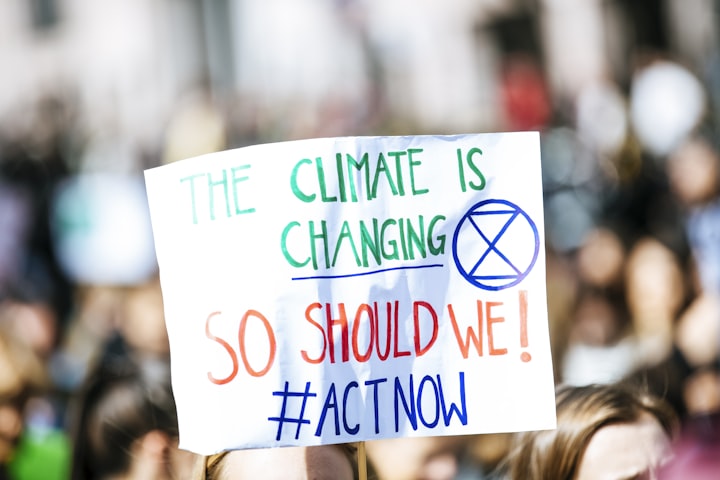Our Oceans, Our Lives
If our oceans die, so does life and our children's future.

The earth's oceans are the largest carbon sink on the planet, storing some 93 percent of all greenhouse gases and 30 percent of carbon dioxide. Due to increased human activity and acidification, our oceans and much of the sealife the oceans support are struggling to survive.
The effect greenhouse gases have on the oceans has not received nearly as much attention as ocean plastic pollution. This is mainly due to the problem not being a visible one. Many people do not realize that oxygen is as essential to ocean life as it is to all life on land. And while it can vary in different oceans and at different depths in the oceans, science is revealing rising sea temperatures are causing greater deoxygenation in deep ocean depths that are already low in oxygen.
This is not good news for the 228,450 known species that inhabit the earth's oceans and for an estimated 2 million or more that remain a total mystery to ocean biologists and scientists. It is the opinion of many in the biological sciences community that a great number of the undiscovered ocean species are likely to go extinct due to acidification, global warming, pollution and climate change before they are ever identified.
When confronted with these facts, the average person gives a shrug of the shoulders and agrees this is a major problem but asks, "What can I do?"
This is perfectly understandable. Living in the 21st century, we are overloaded with news, with dire warnings on everything from a global warming disaster to a pandemic disaster to rising oceans to genocide in various countries around the world and more. How much can the average person take it all in? I think about my father's world and how different it was to mine. He was born in 1898 and passed away at the age of 62, before the arrival of television in New Zealand. In his life, there was no 24-hour news, no smartphones, no social media, no "immediate" news, no sound bites. Life was easy going relatively speaking. If a disaster happened overseas, it would appear in the newspaper or on the radio days later.
We lived close to the ocean and our vacations were always spent in a seaside bach (New Zealand for holiday cottage). The beach was our go-to place. My siblings and I learned to swim around the time we learned to walk. We spent a lot of time around boats and were very comfortable with the vagaries of the ocean. We learned about tides and currents; where to swim and where not to. What fish to keep and what to throw back (keeping stocks replenished). We had meals on the beach, often with feasts of clams and mussels freshly gathered, cooked in a billy can on a campfire on the beach. When the tide was out we roamed the rocks with our dad, with a hammer and screwdriver, gathering buckets of oysters. We loved storms and could sit for hours watching huge rollers smashing down on the beach. The after-effect of storms was countless hours of beachcombing. Every now and then we would discover a glass fishing float from an offshore fishing boat. But no plastic! This time in our lives pre-dated the terrible effects of this universal pox on our environment. How fortunate we were.

In my teenage years, I became addicted to surfing. An ideal day was to arrive at the beach before the sun rose and leave after the sunset, spending the day wave riding on a clear, pollution-free ocean. I have memories of long days, glassy swells, hot sun, burnt skin and the badge of a dedicated surfer: knee bumps.
When I got married, my wife and I bought a sailboat. All three of my kids became good sailors, beginning as youngsters at the tender age of three. We had a sailing dinghy and the sailboat had a tender with an outboard. All three kids were very adept on the water and we had numerous sailing holidays exploring the coastline of beautiful British Columbia.
My three kids learned to appreciate the ocean as I am sure their children will. What has to happen now is a global appreciation of all the world's oceans and seas. They are not an infinite resource. They are part of the planet's life cycle. If the oceans and seas die, so do we. It is as simple as that. The following are some major issues the oceans are facing:
The Cruise Ship Industry
Recent data has shown that one cruise ship emits as much pollution in one day as one million cars according to the German environmental study group, NABU Nature and Biodiversity Conservation Union. Their research found pollution from the cruise ship industry is still massive despite claims from the industry executives that newer vessels are clean and green. NABU carried out studies on a number of cruise lines and have proven that in nearly all cases, their attitude to the environment is still poor if not downright negligent.

“The cruise companies know what they are doing, and they know about the problems. But still, they order new ships and don’t install emission abatement systems.” This according to Dietmar Oeliger, the head of transportation studies at NABU
Plastic and Our Oceans
Plastic is stifling this planet. It is being consumed by the sea life and land animals we consume. Ergo, humans are consuming plastic in ever-increasing amounts. Oceans and many of our great waterways such as the Great Lakes are now polluted with microplastic balls; as are the fish that inhabit the lakes. There are now 8 million metric tonnes of plastic discarded into the oceans each year.
Global Shipping
There are reams and reams of material on the internet on the issue of shipping lines and pollution. Freighters and container ships are becoming bigger and more polluting. And, most worrisome – climate warming is now providing shipping with access to very eco-sensitive areas such as the Arctic and the Antarctic. It is not if a shipping accident happens in one of the polar regions, it's when.

One freighter or container ship, the length of six football fields running 365 days a year emits as much sulfur dioxide into the atmosphere as fifty million cars in a year. Think about that and crunch the numbers on over 52,961 cargo ships in the world’s merchant fleets as of January 2020. It is estimated the pollution from freighters causes over 60,000 premature deaths each year. The high sulfur emissions from ship fuel create hot zones of pollution in large ports like Rotterdam, Hamburg, Hongkong and Newark, New Jersey where there is a higher than average incident of respiratory illnesses.
Global Warming and Coral Reefs
My wife and I and our children were fortunate enough to be able to visit the Great Barrier Reef in 1989. The reef is (was) a kaleidoscope of color with a myriad of sea life of all shapes, sizes and color. This one vacation experience was, I think, a real contributing factor in my children developing an appreciation for the natural world and growing into the environmentally aware adults they are today.

According to many experts, it is going to take Herculean efforts to reduce coral reef degradation around the globe. Depending on which source you read, the Great Barrier Reef has lost anywhere from 50% to 65% of its live coral due to rising seawater temperatures and its effect of bleaching (killing).
Need For Concerted Action
The earth has been around for an estimated 4 billion years. Modern homo sapiens have existed for about 100,000 years, give or take. Neanderthals, who died out around 35,000 years ago were around for about 450,000 years. What are the chances of our species lasting that long if the degradation of the oceans continues unchecked?
As long as we have wars, religious conflict, greed, power struggles, unchecked pollution, greenhouse gases, and destruction of our forests and oceans, the future for homo sapiens could be dire.
How my family is doing our small bit to assist our oceans is as follows:
Buy pre-owned whenever we can
Reducing buying to absolute necessities
No cruise ship vacations
Picking up plastic at beaches
Using reusable shopping bags
Recycling everything that is recyclable
Using ocean-friendly sunblock
Talking the subject up with friends
Writing blog posts on safeguarding oceans
Contributing to environmental organizations
Future children have the right to the pleasures and benefits of clean oceans that I and my children experienced.

If you have any comments, disagreements, or additional information on this post, please contact me through my website.
Follow me on TWITTER, FACEBOOK & LINKEDIN.
About the Creator
Michael Trigg
I love writing and I think it shows in my posts. I also enjoy feedback, particularly of the constructive kind. Some people think I am past my "best before date" but if that is true, it just means I have matured.






Comments
There are no comments for this story
Be the first to respond and start the conversation.